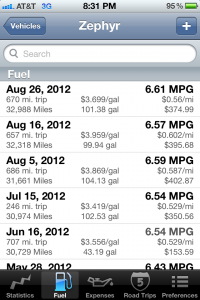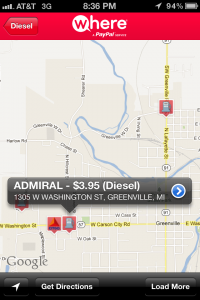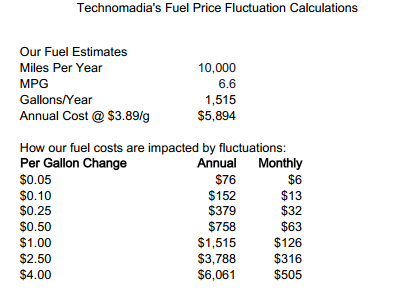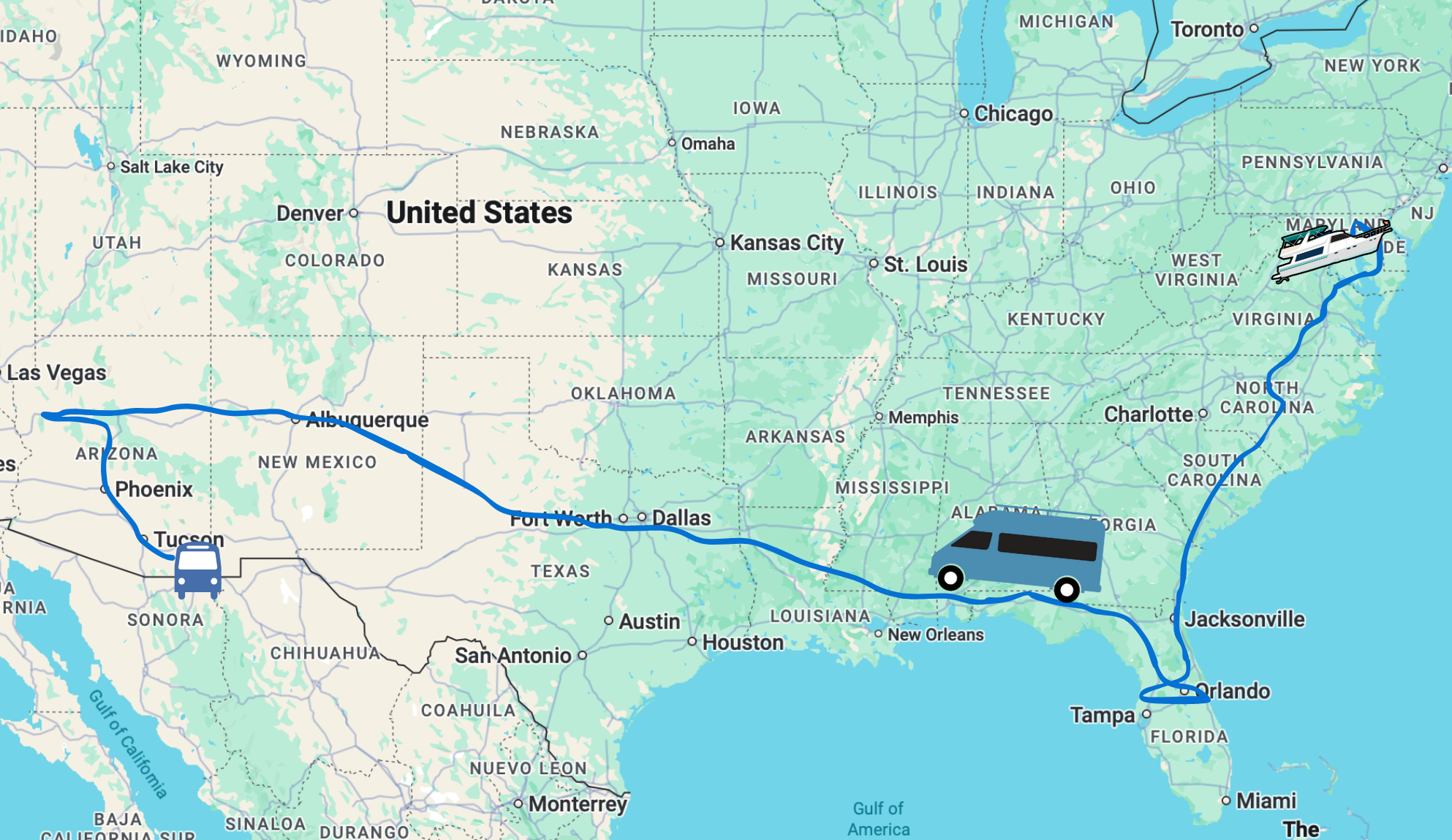
This article was originally published in 2012. We have a more current version available, also now reflecting our boating fuel costs:
Pouring Rent Into the Tank: A Perspective on Fuel Costs for Full Time RVers and Boaters
One of the first objections naysayers have about a full time RVing lifestyle is fuel costs, and how they’ll make our lifestyle financially unsustainable.
Yes, without a doubt, it is a mighty big chunk of change to fill up the tank in most RVs. We consider our tank to be 120 gallons (it’s really 140, but with no fuel gauge – we play it safe), and at $3.89/gallon it costs around $466 to fill. On a good day we get about 6.6 mpg, giving us a range of almost 800 miles on a tank.
Update: In summer 2013, we had an engine rebuild and decreased the size of our fuel injectors in the process. As a result, we’ve been averaging closer to 7mpg. And we now have a fuel gauge.
Suffice it say, our RV ain’t no Prius.
But then again, we never lived in our Prius.
It seems logical that fuel costs should be a primary concern for us, however here are 6 reasons that we don’t freak out when fuel costs rise:
-

We think our fuel & camping costs are quite reasonable, considering we always have amazing new views and locations! Fuel is now a housing cost – Our RV is our home, not just a mode of transportation. We don’t have a mortgage/rent payment, utilities, lawn maintenance, homeowner’s association fees, etc. RV fuel costs and campground fees pretty much replace those stationary living costs for us. But unlike a mortgage or rent payment they are not a fixed cost. We have total control over choosing how much we want to spend at any given time. In 2012, we averaged $741/month for these two costs, and we’ve been anything but frugal lately. We consider that very affordable for the caliber of lifestyle we have, always living in the perfect spot!
-

Food is a bigger cost for us than RV fuel. Fuel is a small portion of our costs. Fuel actually does not make up an overly significant portion of our expenses. So far this year, it represents only about 14% of our travel costs. Food and campground fees are bigger costs. And others like insurance, connectivity and maintenance follow up behind. You’re welcome to view our published monthly travel costs.
- We don’t drive much. Many full time RVers either work from home, park near their work location or are retired – meaning they don’t commute. When fuel costs go up, our commuting friends however must absorb the increased prices to keep their paychecks coming in. Aside from our RVing miles, we average about 500 miles a month in our MINI for errands and local touring. Another difference is because we visit family and do fun stuff during the course of our regular nomadic lifestyle, we don’t also have vacation and personal travel miles on top of our living expenses to ‘escape’.
-

We use the iPhone App ‘Road Trip’ to track our fill-ups. Fuel consumption is voluntary. If our income doesn’t allow for a lot of miles this season, we can slow down our pace and find cheaper monthly stays, boondock on public land, workamp/volunteer in exchange for free camping or driveway surf with gracious hosts. RVing allows for lots of flexibility in controlling your costs. Last month we consciously decided to splurge nearly $1200 on fuel to fund being more in a tourist mode and explore new areas to us. But in February and April, we spent $0 on RV fuel while we were still in Florida.
- Fuel costs fluctuate by location. We have agility to plan our fill ups in locations with lower fuel taxes and prices. Stationary folks are used to paying the prices in their neighborhood, it doesn’t make sense to drive a few dozen miles just to get a cheaper price. If we know fuel ahead on our route will be lower, we hold off on filling up for later and save $10-25 a tank. We use our State Lines app to know state fuel taxes, and Gas Buddy & the Where app to track down the cheapest specific pumps.

We use the ‘Where’ iPhone app to find the cheapest pumps. - Price fluctuations don’t actually add up all that much. With our preferred pace and fuel economy, a $1/gallon increase equates to just $1,515/year, or $126/month. Not fun of course, but I’ve had landlords up my rent by that much before and my former Florida home insurance rates had a similar annual increase once. A simple fact of life is that your cost of living can go up at almost anytime for a variety of reasons, and you must be prepared for it. Budgeting at the very edge of your income level can be a tricky situation in any lifestyle.
When planning your fuel budget, don’t assume current prices. Plan for higher costs and be pleasantly surprised when you find cheaper fuel.
Here’s some calculations we ran showing how a fuel fluctuation impacts our annual and monthly expenses:
Yeah, a $2.50 or more increase would cause us to contemplate changing our pace or budgeting differently, but still isn’t likely to take us off the road. And at that level of fuel increase, we’re all feeling it in transportation costs in our food, delivery and commuting costs too. But anything less than that is easy enough for us to offset by driving a few less miles, writing another app to sell, eating in a little more and/or going out to the movies less.
Want to play around with these calculations for your situation? I set this up as a public Google Docs Fuel Fluctuation Calculator, and you’re welcome make a copy.
Yeah, it sucks to pay more for something and I don’t mean to make light of it – I know it’s more painful for those on fixed incomes. But overall, we’ve seen so many fuel price fluctuations (both up and down) since we hit the road 6 years ago – that they really don’t surprise us.
We just roll with it, keep it all in perspective and remember we choose our awesome life of mobility.
And besides, talk to folks in other countries and even California fuel rates will seem downright cheap in comparison! Over in Europe, rates are now over $8/gallon.



This is so helpful, and you both are aces in my book with all the help you have given us, directly and indirectly. Thank you
In comparison, we pay twice your monthly average (based on the $721 quoted above) for our combined commute fuel costs and mortgage/real estate taxes for our sticks and bricks home. Considering I work from home and do not have a daily commute, it makes your fuel and campground fees look like a real bargain. While we may never end up in an RV, we’re looking to downsize into a smaller, older home to bring that number down considerably.
Great info! Thx!!
Spot on!
If your fuel gauge is still out, try looking at Aircraftspruce.com. It’s an online store for aircraft builders, but they have programmable fuel gauge/computer systems for a variety of prices. When I had my Mitsubishi truck I could not get a replacement sender as the truck was over 10 years old and junk yards have to remove the gas tanks before putting the cars on the lot for customers to get the parts they want. I bought a sender/gauge combination from Aircraft Spruce and it worked out great.
This is a great and very creative tip – thanks!
We feel $4 bucks a gallon is a bargain when snowbirding in the US. It always hurts to be back home on Vancouver Island, BC in the summer and pay around $5.50 a gallon. Lucky in the summer we stay fairly stationary.
Like you say it’s not the biggest part of the budget and is flexible.
a lot of folks ask how we can afford diesel – to which I reply how do you afford real estate taxes…
Exactly! And if diesel is feeling too pricey, you can just cover less miles. You don’t have that sort of control when it comes to property tax!
We agree!! It helps that we like where we’re going!
Cherie….Elaine and I call buying diesel “paying the rent”. the great thing is we can decide what the rent is going to be every month…we are not at the mercy of a landlord telling us what the rent is going to be. This month we will pay more rent by choice. When we are at Amazon.com for 2.5 months we will be paying NO rent….not for diesel, and literally not for our RV site. This was a good article…thank you!
Paying the rent… I love that Clarke! I think we may start saying ‘Time to pour some rent in the tank!’. Thank you for sharing that.
Loved the post…it is what we do too have been for the 10 years we have been fulltiming…thanks for sharing..and thanks for the gas buddy trip planner…
It’s wonderful to hear that others approach it similarly! Happy adventures!
Good post. We agree w/ everything you said. This summer we deliberately slowed down and decided to save on both fuel & camping costs. The result is that we haven’t filled up the MH since mid-June and still have a half tank. So, totally agree it’s a flexible and voluntary cost.
The other app we LOVE is GasBuddy…use it alot for finding lowest fuel costs in an area.
Nina
We love the GasBuddy app and website too.. their trip planner is really handy for spotting quickly where on your route would be an ideal place to fill up.
And isn’t it a nice feeing to leave a stationary spot knowing you have a few hundred miles left on the tank before pouring more money in? 🙂 Sounds like you guys had an amazing summer!
Compare this to the petrol (gasoline) price in South Africa of $5-38/gallon and it seems cheap to us:). Our prices are relatively even higher because our wages are comparitively low. While you guys have an annual GDP per person of over $48k ours is under $11k.
Thanks for the informative site, I take pleasure in reading of your experiences.
I totally agree.. travelers in America are relatively spoiled with less expensive fuel costs than other areas of the world.
I know folks in other countries just have to snicker when they see American’s extolling ‘Ouch! I just paid $4/gallon!!’.
When we had our Class A (which was really only an “entry level” Class A, not a big fancy schmancy DP like these other guys) I would get a comment once in a while about how much fuel it consumed. (Because you know, that’s really something you should comment on?)
My reply was invariably, “It gets excellent mileage for a house”, and that would also invariably shut them up.
Perfect response!
We’ve used that one two, especially at fuel pumps. Always seems someone next to us wants to know what kind of mileage we get and then grumbles at the response.
yep fuel costs suck especially here on the west coast… so how are we going to reduce fuel costs next year? we are going back east!
Excellent plan! Fill up the tank enough to get to the next cheapest state, and boogie on! Cheers to great east coast adventures… if you find yourself in Florida, give us a holler.
Agree with all your comments about your fuel cost. Has just got plum crazy on fuel cost. I,ve added a extra tank so can longer on the cheaper fuel when I can find it. Just do a little more looking on the Internet on my planned route for fuel prices. Happy Rv’ing
A little planning and research can save some bucks, for sure! And great idea on adding a spare tank to stockpile cheaper fuel when you find it.
Agree that fuel cost is an expense that you can control, or at least manipulate. Some months we drive more, others, less. We budget $750/month based on a figure of 7mpg and $4.00/gal. I figured high, often get diesel for less per gallon and many times I’m getting more that 7mpg, usually closer to 8. Depending on wind direction, I can get a little more or a little less. Bottom line, this gives us quite a bit of miles available to travel each month.
The months we travel less and stay in a fixed place longer, the savings go into the “fuel fund”.
PS: Thanks for the tip on the South Dakota vanity license plates. Hope to get the plate we want soon.
Hi Paul – love that you guys budget like that. It really does make it a lot easier to ride the fluctuations. And when you do save on the budget, you can feel all that much better about splurging on a big repositioning. Kudos! And thanks for sharing.
Excellent post. Is it okay if I share with some of my email friends? I won’t do so unless I hear from you.
I found it very informative.
Yes.. please, share away! Bloggers love having their content shared (with credit, of course.)
And so glad you found the information useful. Best wishes in your own journey!